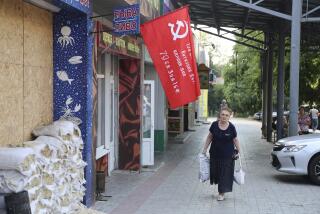Local Palestinian Elections Seen as Gauge of Leadership’s Sway
- Share via
KALKILYA, West Bank — Amid colorful campaign banners and blaring car horns, Palestinians throughout the West Bank and Gaza Strip voted Thursday in municipal elections seen as a bellwether for the new Palestinian leadership’s prospects in parliamentary balloting this summer.
At stake were 84 local councils and races focused primarily on hometown issues such as roads, schools and sewage.
But the vote tallies were sure to be read as a sign of the relative strength of Palestinian Authority President Mahmoud Abbas’ Fatah organization and of the Islamic group Hamas, which did well in two earlier rounds of local balloting and plans to field candidates in the parliamentary elections in July.
Official counts were to be announced Sunday. Firas Yagi, executive director of the Palestinian local elections commission, told Voice of Palestine radio station today that Fatah appeared to have won in slightly more than half of the communities and Hamas in a third of them.
The Palestinian Center for Policy and Survey Research conducted an exit poll in the 14 largest municipalities voting that showed Fatah winning council majorities in six and Hamas in two, with the others split or dominated by other parties.
“The results will be an indication of who supports” Abbas’ government, said Ali Issam Nazzal, a 32-year-old insurance agent in Kalkilya who cast his vote for Fatah, one of three slates on the ballot here.
“I’m supporting a bloc that supports Abu Mazen and the Palestinian government,” he said, referring to Abbas by his nickname. “I’m also looking for [local] services, but mainly my message is a political message.”
Kalkilya, with 46,000 residents, was the biggest of 76 West Bank communities electing local leaders Thursday. In the Gaza Strip, residents voted in eight communities, including Rafah, an impoverished city of 187,000 that has seen frequent clashes between Palestinian militants and Israeli troops in more than four years of fighting.
“All the people here hope that the current faces on these councils will be changed,” said Midhat abu Khaled, a 30-year-old Hamas supporter in Rafah. He said a victory by the Hamas bloc would “change the structure of the municipality.”
Voting overall was reported to be generally smooth, with turnout topping 80% in some areas.
Analysts cautioned against reading the municipal results too broadly, noting that family ties and personal reputation were more likely than party labels to swing local contests. In Kalkilya, for example, four major families were represented; one of them, the Nazzal clan, boasted nine candidates across all three slates.
“The local elections are primarily service elections. They are not primarily a measure of the popularity of Abu Mazen or Hamas,” said Muhannad Abdel Hamid, a columnist for Al Ayyam, a newspaper affiliated with Fatah.
Still, activists on all sides viewed the votes as an important dress rehearsal for the July 17 parliamentary contest.
In Kalkilya, honking taxis bristled with party flags -- yellow for Fatah, green for Hamas -- while boys in baseball caps passed out campaign leaflets at the entrances to polling stations.
It has been a heady season for Palestinians, who see such electioneering as a sign of democracy in the making. In addition to two previous rounds of municipal voting -- the first since the 1970s -- voters swept Abbas into office by a wide margin during a presidential election in January.
“It is very exciting. We are feeling that there is democracy,” said Talal Awinat, a 45-year-old math teacher supervising a polling station in Kalkilya.
The local elections are the first step into electoral politics for Hamas, whose military wing has carried out dozens of suicide bombings and other attacks against Israelis since the outbreak of violence in 2000.
Hamas’ network of social services has gained the group a fervent following, especially among the poorest Palestinians in Gaza Strip refugee camps.
Hamas is emerging as the main challenger to Fatah, which was formed by Yasser Arafat and has dominated Palestinian politics for decades. Hamas candidates have played up religion and portrayed themselves as an antidote to the corruption and cronyism that flourished in the Palestinian Authority under Arafat, who died in November.
“The important thing is to get Fatah out,” said Issa Safiri, a vegetable vendor in Kalkilya.
Safiri, 45, said Abbas had failed to improve the lives of ordinary Palestinians during nearly four months in office, though he added that restrictions imposed by Israel had not helped.
Kalkilya is nearly enclosed by a series of Israeli-built fences and a 25-foot-high concrete wall, and residents say the barrier has made their economy wither. Israel says the barrier, part of a huge divider in and around the West Bank, has kept suicide bombers out of Israel.
Safiri, who voted for Hamas and independent candidates, said the divider has cut his family off from four acres of farmland.
But some voters expressed worry that Hamas would impose a social code that would be overly rigid. A 33-year-old farmer, Mohammed Bakr Nazzal, said he was turned off by a Hamas suggestion to open the local zoo to men and women on separate days.
“This kind of idea harms the social fabric,” he said. “It’s too extreme. It’s not even realistic.”
Times special correspondent Fayed abu Shammalah in Rafah contributed to this report.
More to Read
Sign up for Essential California
The most important California stories and recommendations in your inbox every morning.
You may occasionally receive promotional content from the Los Angeles Times.










